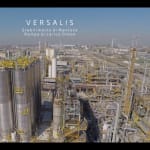
Lower CO2 emissions, energy saving and greater safety: these are the key objectives of the new railway siding constructed on the Versalis plant site in Mantua and put into service a few weeks ago to transport KA oil to Radici Chimica SpA in Novara.
KA oil is one of the main chemical intermediates used in the production of adipic acid, which is then utilized in polyamide 6.6 production, the core business of Radici Chimica and the basis of subsequent RadiciGroup manufacturing processes for its plastics engineering and advanced textile solutions businesses. Versalis, Eni’s chemical subsidiary, produces KA oil in its Mantua plant from which RadiciGroup buys tens of thousands of tons per year.
Massimo De Petro, CPO for Strategic Materials and Logistics of RadiciGroup, stated: “Before the railway siding was built, the intermediate went by truck from the Versalis site in Mantua to the nearby railway freight yard of Mantova Valdaro and then travelled by rail to Radici Chimica in Novara, where there has been a goods station on the premises for some time. On account of this new investment, we can now manage KA oil logistics solely by tank car, thus ensuring greater safety in the handling and transportation of the material”.
Marco Chiappani, Head of the Intermediates Business Unit at Versalis, said: “Mantua plays a central role in the Versalis production system, the sustainability strategy of industrial processes, and also in all the support services, up to the products destined for the market. They are focused on the search for innovative and sustainable solutions, and when projects aimed at reducing the environmental impacts are developed together with other companies, a double result is achieved. Investing in more sustainable and safer logistics was an obvious choice, especially in collaboration with an established partner such as Radici Chimica”.
Construction work on the Versalis siding began in September 2019 and finished in March 2021. After the first trial loads, the siding became operational in mid-April. The goal is to reach maximum capacity by July and achieve full sustainability in the transport of a fundamental raw material for Radici Chimica’s operations.
Railway transport yields a considerable reduction in CO2 emissions (-80%) and in primary energy consumption (-75%), compared to road transport over the same distance.
The siding is another example of sustainable logistics put into play by Radici Chimica – in this case, also supported by Versalis – that demonstrates its strong interest in using rail transport. Today, over 90% of Radici Chimica’s incoming raw materials and an ever-increasing percentage of outgoing products are transported by rail.
In keeping with the RadiciGroup sustainability strategy aimed at improving the environmental performance of all its businesses, Radici Chimica has chosen intermodal transport for a number of years to lower the environmental impact of transport, optimize goods handling and provide better services to customers in terms of greater delivery reliability.
Within Eni’s broader decarbonisation strategy, Versalis has launched a transformation plan that aims to make its activities and products increasingly diversified and sustainable. In this development path, maximum attention is also paid to logistics and infrastructural solutions aimed at improving sustainability.


